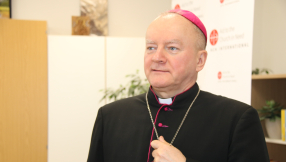We generally only start thinking about death and resurrection when someone has just died. Which is just about the worst time to try and have a proper debate about it, says New Testament theologian Paula Gooder.
Gooder finished a book about heaven a few months before her best friend died, and found that she almost wished she hadn't – all the theological arguments weren't what she needed at that time. Instead, she says we need to approach this subject bearing in mind – and continually returning to – the verse "Nothing can separate us from the love of God". Gooder says that at a time when she had many questions about heaven, but didn't want technical answers, this verse "answered all my questions".
But, with that in mind, Christians can, and should, think about what the Bible says about life after death. Here are six questions to get you started:
1. Does the Old Testament say anything about the afterlife?
At first glance it may look like the Old Testament doesn't talk about the afterlife very much. Gooder argues that it might instead look different from what we expect. For example, when the books of Kings repeatedly say: "...lay with his ancestors and his son reigned in his stead", it shows they did have a belief in life after death. The difference is that we think in terms of the individual; we want to think about our own personal existence beyond the grave, whereas they were concerned about their family after death, and it is the family line that continues.
2. Does the Bible point to a resurrection of the body?
"There is no doubt in my mind that if you were to ask the writers of the New Testament they would say they believe in the resurrection of the body. The Gospel writers, Paul, the writer of Hebrews... they all write about the resurrection of the body at the end times," says Gooder.
3. When will the dead be raised? Has it already happened?
There isn't a single answer for this, says Gooder, and the reason is that "it is a mind blowing mysterious truth and big theological truths don't boil down into simple sentence answer."
One option is that the dead are awaiting a future resurrection of the body. Another is that it has already happened, but outside of time. Both options are entirely possible – biblically speaking, she says.
The Jews believed that the resurrection of the body would happen when the end times broke in. The resurrection was a sign of that and we would then enter the new age. Luke and Paul think that the resurrection has already happened – Jesus was raised from the dead, so the new age has started.
But when trying to answer this question, we continually stumble across the problem of time. We can't really talk about it without using the past, present or future tense, but God is outside of time.
Gooder adds: "When we think about those we love who have died – how is their existence in heaven perfect if they aren't with their loved ones? Maybe we have already been raised but we just don't know it yet."
4. Do our souls go to heaven without our bodies?
It's a common idea in Christian thinking that the body is corruptible but the soul is not. This is one area where we see a difference between Hebrew and Greek thinking, says Gooder.
Paul had a Hebraic understanding, but early Christian thinkers, including Augustine, were Platonists, and Plato "wasn't a fan of the body". Our understanding of Paul's writing, has therefore been influenced by the Greek view, which rejects the physical. Gooder says this doesn't mean that the Greek perspective should be neglected altogether as it brings an important insight.
"But when Paul uses the word 'soul' he never uses it to mean that thing which is separate from the body," says Gooder. Instead it's always part of the body – it's a bigger word, under which all the other parts sit: the body, heart mind. However, Gooder also points out that Paul uses the term 'inner person' and in 2 Corinthians 5 he speaks of the 'outer tent'.
5. What will marriage look like in heaven?
In Matthew 22:30 Jesus responds to a question about marriage in heaven from the Sadducees by saying: "In the resurrection they will neither marry nor are given in marriage, but are like angels in heaven."
Gooder says she has been influenced by Robert Song's book Covenant and Calling on this issue. Song describes the understanding of what marriage was about in the biblical period, in comparison with our own (somewhat Victorian) idea of marriage. In the biblical image, marriage encompasses two main strands: one is inheritance – passing on the family name and property; the other strand is birth – the need to keep the family line. Song points out that you only need birth where there is death. But birth will not be necessary in heaven because you do not need an 'answer' to death, as we do in this creation.
But, adds Gooder, this doesn't mean there are no human relationships or love. Angels in heaven do not have children, but they are a family. "This turns the passage [from Matthew] around," she says. "It's not about not having relationship, but just not birth."
6. How does belief in the resurrection of the body affect our engagement with politics?
Christianity is sometimes characterised as not having an emphasis on the here and now. "The point about resurrection," says Gooder, "is that it makes you love the here and now more and not less. We live in a world that will have physicality then as it does now – it will be created, we will have bodies."
This means that it matters who you vote for, because it's part of how you relate to the world God made, she adds. This should also mean that we should think about the way we care for our bodies and for God's creation.
"It's as if this life is the training ground for the world to come. We are passing through with our vision on the new creation – when our bodies will be full of life – but they are going to be bodies that are like the ones we have now."
Paula Gooder was speaking at a seminar in conversation with Paul Woolley at Spring Harvest in Minehead.













